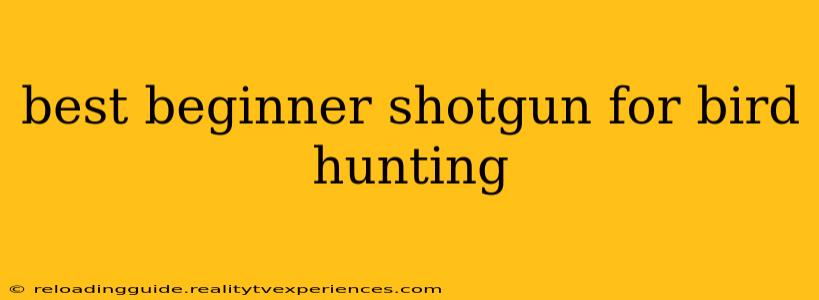Choosing your first shotgun for bird hunting can feel overwhelming. The market is flooded with options, each boasting unique features and price points. This guide aims to cut through the noise, helping you select the best beginner shotgun that balances performance, reliability, and affordability. We'll explore key factors to consider and highlight some top contenders.
Key Factors to Consider When Choosing a Bird Hunting Shotgun
Before diving into specific models, let's examine the crucial aspects to prioritize:
1. Gauge: 12, 20, or 28?
Gauge refers to the diameter of the shotgun barrel. Smaller gauges (like 28 and 20) generally have less recoil, making them more comfortable for beginners. However, 12-gauge shotguns offer more power and a wider selection of ammunition.
- 12 Gauge: Powerful, versatile, and widely available ammunition. The recoil can be significant for beginners, though.
- 20 Gauge: A good compromise between power and recoil. Lighter weight and less recoil make it ideal for beginners and smaller-framed hunters. Ammunition is readily available, but may cost slightly more per round than 12 gauge.
- 28 Gauge: The lightest and lowest-recoil option, providing a very comfortable shooting experience. Ammunition can be more expensive and slightly harder to find than 20 or 12 gauge.
2. Action Type: Pump, Semi-Auto, or Over/Under?
Each action type offers a unique shooting experience:
- Pump-Action: Reliable, relatively inexpensive, and simple to operate. Manually cycling the action after each shot teaches firearm safety and control. Great for beginners learning proper technique.
- Semi-Automatic: Automatically cycles the action after each shot, allowing for faster follow-up shots. However, they tend to be more expensive and require more maintenance. While convenient, they might not be the best choice for developing fundamental shooting skills.
- Over/Under: Elegant and accurate, but typically the most expensive option. They feature two barrels stacked vertically, often used for sporting clays or upland game hunting. Generally not the best choice for a beginner's first shotgun.
3. Barrel Length: Finding the Right Balance
Barrel length impacts both weight and handling. Shorter barrels are lighter and easier to maneuver in tight spaces, but might slightly reduce range and accuracy. Longer barrels are generally better for long shots, but they are heavier. For beginners, a mid-range barrel length (26-28 inches) strikes a good balance.
4. Stock and Fit: Comfort and Control
A properly fitting stock is crucial for comfortable shooting and accuracy. Consider the length of pull (the distance from the trigger to the butt of the stock) and the drop at comb and heel. Getting fitted at a reputable gun store is highly recommended.
Top Shotgun Recommendations for Beginners
Considering the factors above, here are a few shotguns frequently praised for their suitability for novice bird hunters:
-
Budget-Friendly Option: Many reliable pump-action shotguns from reputable manufacturers like Mossberg and Remington are available at affordable prices. Look for models in 20-gauge for reduced recoil.
-
Mid-Range Option: Several 20-gauge semi-automatic shotguns provide a good balance of features and price. Research brands known for their reliability and customer service.
-
Higher-End Option (if budget allows): If budget isn't a primary concern, higher-end 20-gauge shotguns offer superior build quality, features, and ergonomics.
Disclaimer: This guide provides general information. Always consult with experienced hunters and firearm professionals for personalized advice. Proper gun safety training is essential before handling any firearm. Remember to check local regulations and obtain any necessary licenses and permits.

